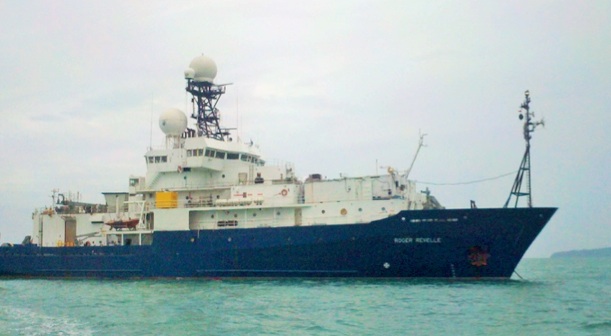
Photo by Timothy Lang
Colorado State University has received a $1.3 million award from the National Science Foundation to develop an advanced ship-based radar for open-ocean atmospheric research. This radar, known as SEA-POL, will be directed by Steven Rutledge, professor of atmospheric science, and University Distinguished Professor V. “Chandra” Chandrasekar of the Department of Electrical and Computer Engineering and Associate Dean for International Research in the College of Engineering.
Seventy-five percent of the world’s rainfall occurs over the open oceans. Studying oceanic storms and measuring the rainfall they produce with the state-of-the-art polarimetric Doppler SEA-POL will allow scientists to better understand how tropical clouds and storms contribute to climate change. SEA-POL will be deployed periodically on U.S.-operated world-class research ships on several month-long cruises to various areas of the world’s oceans.
SEA-POL will utilize a dual-polarization technique, where both horizontal and vertically polarized radar signals are transmitted and received by the radar, a technology pioneered at the university’s CSU-CHILL National Radar Facility, also directed by Rutledge.
The polarization technology improves rainfall estimation and provides information on the distribution of liquid and ice particles in clouds, information that is vital to improving understanding of the global water cycle, air-sea interaction and validating computer models of global precipitation. Today that same technology is used on the national radar network used to detect severe weather.
Combined expertise
Rutledge was a principal investigator on 2011’s DYNAMO study, an international project that deployed radars and other specialized equipment on ships and islands in the Indian Ocean to monitor weather conditions in a region that has profound effects on global climate. “SEA-POL will be a very challenging project, but in the end the new radar will enable a whole new area of scientific research on oceanic storms,” said Rutledge.
Chandra’s research focuses on short-range weather radar networking; he has recently worked on more precise tracking of tornadoes and early warning for floods in the Dallas/Fort Worth area. He is also deputy director of the National Science Foundation Engineering Research Center for Collaborative Adaptive Sensing of the Atmosphere (CASA).
“CSU has been a pioneer in dual-polarization technology research, at many frequency bands, and through this project we are expanding our operations. This expansion will provide great opportunity for our students, both at graduate and undergraduate level,” said Chandra.
The combined expertise of Rutledge and Chandra is making SEA-POL possible.
SEA-POL, which will operate at CSU when not deployed at sea, will help attract top-quality students to science and engineering, as the radar will be integrated into existing academic programs at the university.
“While the university has spearheaded the deployment of ship-based Doppler radars without the polarimetric technology in the past, SEA-POL provides researchers and students with the opportunity to be among the first to use this cutting-edge technology,” said Alan Rudolph, Vice President for Research at CSU.